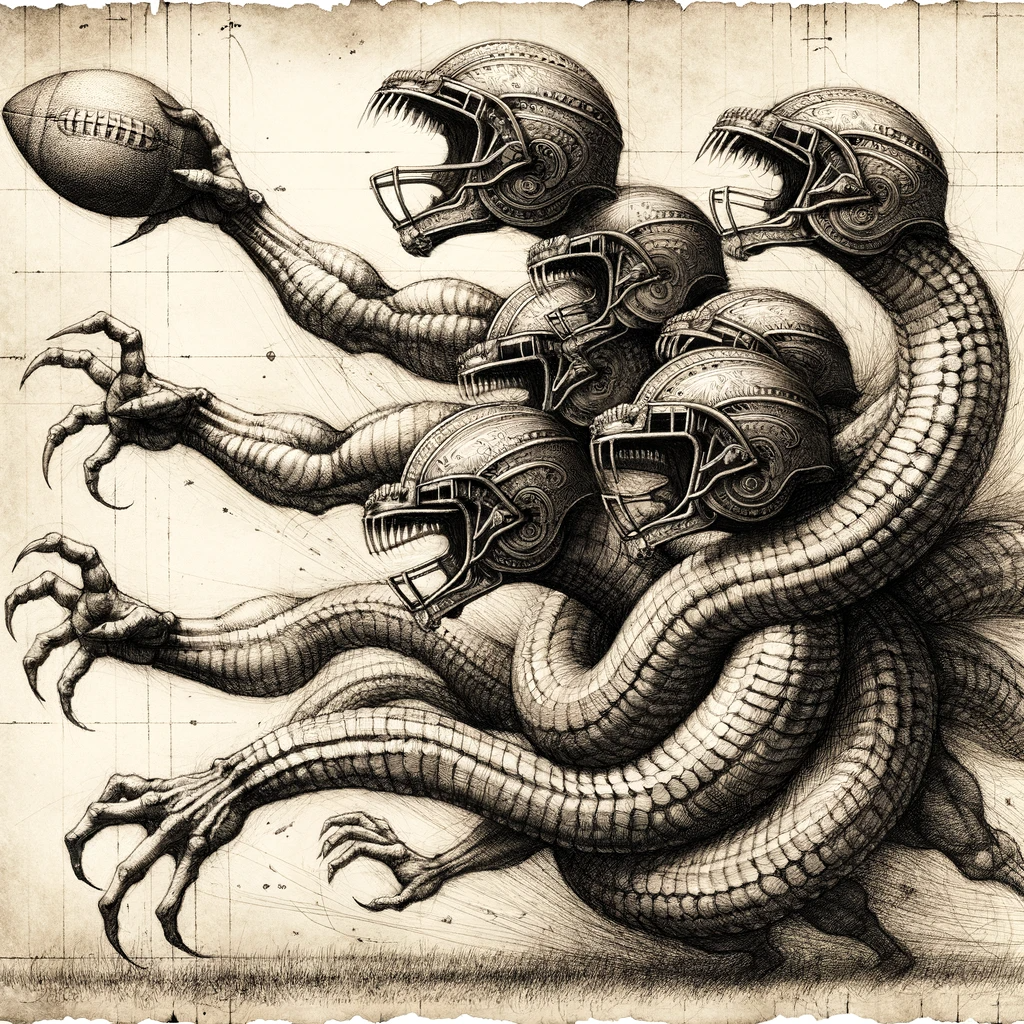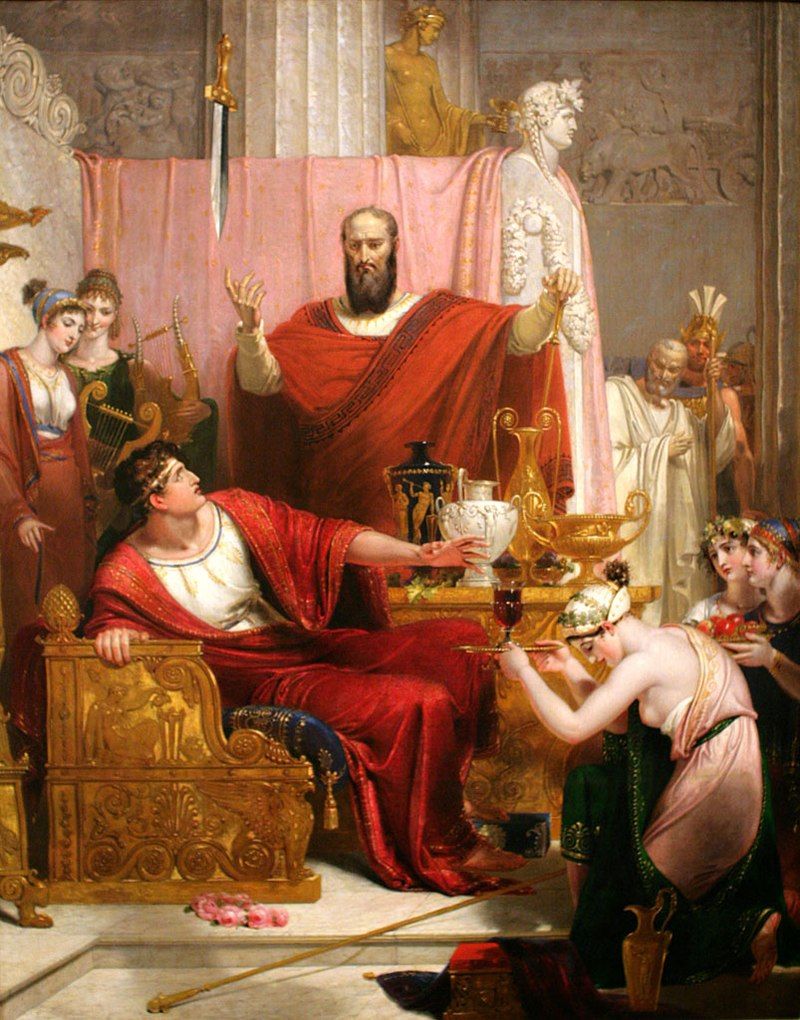Inside the Huddle: Unraveling the Leadership Knot in the NFL

Leadership in the NFL is a complex puzzle. As a five-year veteran, I've seen its multifaceted nature firsthand. In this blog, and with the help of some Greek mythology, I share three characteristics of quality leadership that I've gleaned from my journey: antifragility, authenticity, and knowledgeability.
Be Antifragile
Nassim Taleb introduced to me the concepts of fragility, robustness, and antifragility in his book, Antifragile. This concept is best illustrated by borrowing from Taleb's use of symbolism in Greek mythology to drive home the ideas. For reference, players should strive to fall in the latter two categories.
We start with the Sword of Damocles, an image Taleb frequently uses to illustrate fragility. Damocles, who admired the great power of King Dionysius, was given the chance to experience this power firsthand on one condition: that a sharp sword be hung directly above the throne, held only by a thin horsehair, while he is king. Surrounded by luxury, Damocles was consumed by the constant threat of the sword's descent, realizing that being king meant a perpetual threat of assassination. In Taleb's view, the Sword of Damocles, hanging precariously, epitomizes fragility—appearing strong on the outside, yet vulnerable to the slightest disruption.

Turning our attention to robustness, Taleb invites us to envision the Phoenix. Upon death, the Phoenix succumbs to flames, only to rise anew from its own ashes. It endures the cycle of life and death without altering its essence. The Phoenix, persisting through adversity, symbolizes robustness in Taleb's framework.

However, the pinnacle of this progression lies in the Hydra—an embodiment of Taleb's concept of antifragility. The Hydra thrives on adversity; when one of its heads is severed, two more regrow, making it more formidable with each challenge it faces.
As a quarterback, you want to be at least the Phoenix and ideally the Hydra. A Phoenix is impervious to ups and downs, missed throws, great plays. The Phoenix comes back for more and isn't dissuaded by the randomness, the ebbs and flows of a football game. If you're a Hydra, then you take it one step further. Each challenging game, each missed pass, each critique—they aren't looming disasters akin to the Sword of Damocles, nor are they mere cycles of failure and recovery like the Phoenix. They are, as Taleb would suggest, opportunities for growth and progress. You appreciate the inherent volatility of the game; a missed throw in practice becomes a learning opportunity, the away crowd ridiculing you on a game-winning drive after you've thrown an interception is not a distraction, but calming. Allow every challenge to fortify you, and continuously evolve as a resilient, adaptable leader on the field, embracing disorder and adversity for growth. The team will look to your calmness in these situations and respect you for it.
Be Authentic
We've all encountered the fabricator, the flatterer, and the politician in our respective social circles. This individual plays the part they believe necessary for promotion, to win over a romantic interest, etc. This extends to the football field when the introvert feels the need to be the cheerleader giving speeches, even though they genuinely feel speeches make no difference. Ironically, by trying to be something you're not, you lose respect. Most people can see through the bulls***. The locker room is no different. My advice is to just be yourself, be authentic. Do not aim to please, aim to be honest. If you're an introvert and don't talk much, that's fine, communicate with your understanding of the game plan and your work ethic on the field. When you do talk, when that visceral feeling to spark the offense hits you after a rough three quarters, let it loose. Be in tune with your emotions and express them naturally, not what your coach, your dad, or a book you read on leadership instructs you to do. People respond to and sense authenticity.
Playbook/Gameplan Mastery
Command of the playbook and the game plan is non-negotiable. It's more than rote learning; it's about understanding every play, knowing the ins and outs, and making them second nature. It's about decoding the roles of your teammates and opponents, seeing the big picture, and using this knowledge to maximize outcomes on the field.
Your teammates will come to you for answers, and your command of the playbook and the game plan will give you credibility in the locker room. This technical expertise strengthens your team's faith in you, one day at a time.
Conclusion
In conclusion, these are my reflections and insights derived from nine challenging, exciting years in the NFL and in college. The concepts of antifragility, authenticity, and knowledgeability I've discussed are not hard and fast rules but rather a personal perspective. Leadership, after all, is a complex quality that's difficult to pin down. There are numerous approaches one can take, just as there are many paths to the top of a mountain. Nonetheless, I believe the principles I've shared, drawn from my own journey, can be a valuable starting point for others embarking on their own paths as a quarterbacks, or any competitive field, for that matter.
If you're interested in QB specific throwing, lifting and sprint training, customized to you, with the same systems used to train NFL Quarterbacks, take the assessment and get the app at kinetex.co. If you're interested in reading about all things quarterbacking and throwing biomechanics, subscribe to the blog.
